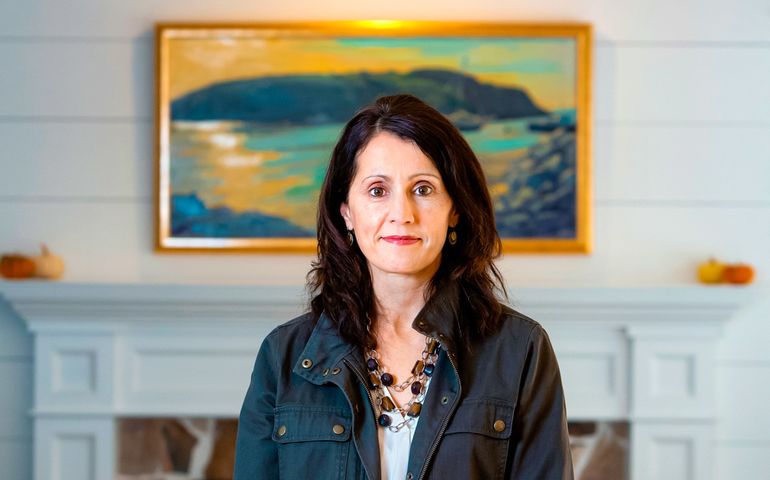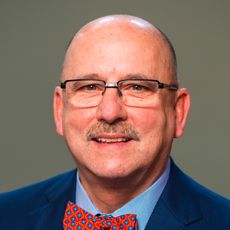
Racial Justice Fund seeks fundamental change to combat racial inequity
 Photo / Tim Greenway
Michelle Draeger is executive director of the Maine Justice Foundation, which established a Racial Justice Fund with $270,000 in donations from corporate and philanthropic leaders across Maine. The fund will support Black, Indigenous, and People of Color in initiatives to combat racial injustice and inequity.
Photo / Tim Greenway
Michelle Draeger is executive director of the Maine Justice Foundation, which established a Racial Justice Fund with $270,000 in donations from corporate and philanthropic leaders across Maine. The fund will support Black, Indigenous, and People of Color in initiatives to combat racial injustice and inequity.
This year’s horrific racial violence across the nation prompted corporate and philanthropic leaders in Maine to raise $270,000 to establish a new program called the Racial Justice Fund, designed to combat racial injustice and inequity throughout Maine.
As a program of the Maine Justice Foundation, the fund’s goal is to support Black, Indigenous, and People of Color and to forge social, systemic and economic solutions to combat racism in Maine’s culture, organizations and systems.
“A critical dialogue about race discrimination is occurring across our nation and state, in our workplaces and inside our homes,” says Michelle Draeger, executive director of the Maine Justice Foundation. “It is before us as a result of countless public acts of violence against Black Americans who are engaging in the simple pursuit of daily liberties – watching birds in a park, jogging in the afternoon, sitting in a car, simply trying to breathe.
“Fundamental change is necessary if we finally want to become a country where every citizen is afforded the freedom of liberty and equal justice, without regard to differences in race. As an institution concerned with equal access to the legal system, the foundation has a responsibility to address racial injustice. As a historically white organization, we also have a responsibility to change and to lead change.”
In Maine and elsewhere, the reality of racism is often cavalierly dismissed, says Marcelle Medford, an advisor to the fund and a Bates College assistant professor in sociology, whose research focuses on immigration and race.
Overdue recognition
“One of the things that emerges in my research, quite often, is the active refusal to contend with race and the presence of racism, and the role it plays in perpetuating the state that we’re in,” Medford says. “Even the emergence of the grant itself was a response to the protests and to the murder of George Floyd. The sad reality is that these things aren’t new. They’ve been happening; they continue to happen.”

The question, she continues, is not only, “Why is it happening?” It’s also, “Why is it that some people are only now recognizing that this has been happening for so long?”
“A large part of it has to do with refusing to contend with even the possibility that race operates in nuanced ways,” Medford says. “In Maine, I see it in the language we use — saying things like, ‘Maine is so white.’ Maine is indigenous. Maine became white through structural and systemic racial oppression.”
Development of the fund began earlier this year.
“Toward the spring, as Maine and the entire nation were reeling from the horrific and unjust death of George Floyd, Breonna Taylor and so many others, we along with many organizations, both public and private, were issuing statements of solidarity and demanding equity and justice for our fellow community members,” says Draeger.
Meaningful impact
“It wasn’t just yet-another tragic, horrible killing of unarmed black people at the hands of police, but about how the highest echelons of America reacted to that,” says Michael-Corey Hinton, an attorney at Drummond Woodsum in the Tribal Nations Practice Group, member of the Passamaquoddy Tribe at Pleasant Point and former president of the Native American Bar Association of Washington, D.C.
Drummond Woodsum is one of the fund’s founders and Hinton is on its advisory committee.
He continues, “That’s why institutions and people who have been living in the same place for so long are all of a sudden talking about it. Something changed.”
Accordingly, several Portland financial service firms approached the Maine Justice Foundation with the idea of creating the fund. The foundation grew the investment by talking with business leaders and seeking founder-level donations, and aims to grow it substantially.
“I really must emphasize that this fund was made possible by the generosity and commitment of so many leading businesses across Maine as well as the Stephen and Tabitha King Foundation,” says Draeger.
Initially, the thought was to create an endowment vehicle whose earnings would generate grant funds.
“But as I began to think about the tremendous and immediate need, which was so evident — every time you look at the news, there was another instance of some horrific death or circumstance that highlights the problems we have — a traditional endowment didn’t seem timely enough,” says Draeger.
As a result, the fund was set up to allow the foundation to spend up to 15% of the original donations for immediate grant-making.
The fund is somewhat new territory for the foundation.
“We needed to educate ourselves about systemic and structural racism, and that effort continues,” says Draeger.
Draeger and her colleagues spent the summer talking with leaders in minority communities to educate themselves about how grants could yield a meaningful impact. They determined it would make sense to create a grant-making advisory committee of people with diverse perspectives, backgrounds and professional experiences to create guidelines and issue grants.
The committee will assess where the funds can make the greatest impact. Overall, Draeger says, it’s important to support programs that explore the underpinnings of racial injustice, how it’s perpetuated through structural systems, and generate remedies.
“We’ll allow Maine’s grassroots organizations, the people who need the money, reach out and tell us how this money will most appropriately be used,” says Hinton.
Unexpected settings
In his own experience, Hinton adds, education is key.
“We’re going to be looking at applicants that demonstrate a desire and capacity to implement programs that seek to bring about change and impact systems of inequity in Maine,” he says. “As a person of color, I know here are endless ways to address this.”
Sometimes those opportunities occur in unexpected settings, he notes. He recalls working with a child, age 5 or 6, while coaching at a lacrosse camp.
“Between practice sessions, I asked him what he wanted to do when he grows up,” he recalls. “He said ‘I just want to move to Ireland.’ I said, ‘Why do you want to move to Ireland?’ He said, ‘There’s too much shooting where I live.’”
As they talked, Hinton says, he realized the circumstances, and the underpinnings of poverty and oppression, that surrounded the child.
“I would never have been able to peel that back from this kid’s life if we weren’t just passing around a lacrosse ball that day,” he says.
Uphill battle
The fund, Medford says, can support efforts to counteract racism — particularly work already underway at the grassroots level with potential to scale up.
“Folks are doing this work on shoestring budgets,” she says. “I think it’s been an uphill battle, in some respects, to be able to expand on that. I’m looking forward to seeing the proposals and how people imagine the ways that this needs to happen.”
The goal is to issue a request for proposals by early 2021.
Draeger says the need can be seen in the lack of racial diversity at law firms across Maine and in leadership across the bar, government and courts.
“That demonstrates there’s a structural flaw that leads to this reality,” she says. “Our systems are not designed to promote BIPOC [Black, Indigenous, People of Color] community members to positions of power and influence. We need to change that for the sake of our state’s prosperous future.
"We must create a place where everyone can succeed and benefit from the equal protections of our laws, the opportunities provided by our resources. We have to demonstrate to the world that Maine is a place of opportunity and justice for everyone so that we can attract and retain the best people with diverse perspectives and backgrounds that will pave the path to a future for which we can all be proud.”
Tim Dentry, president and CEO of Northern Light Health and member of the advisory committee, finds people are willing to have those conversations.

In July, Dentry started a podcast focusing on racial, social and medical justice issues, as part of the institution’s multi-pronged plan to eliminate racism and build a future for social and medical justice. Episodes feature colleagues discussing topics including white fragility, micro aggressions, diversity and perspectives from the LGBTQ+ community.
Those conversations illustrate the potential for programs supported by the fund, Dentry says.
“As CEO, I listen for ways in which I can let our staff know that I intend to reinforce a culture that starts with caring for one another,” he says.
Says Medford, “We need to have real discussions.”
Mainebiz web partners
The entire premise is flawed from the onset: George Floyd was not murdered, he was restrained after having ingested a lethal dose of an illegal drug he was trying to sell on the street - fentanyl. He swallowed the illegal drug when the police officers first confronted him so the inequality that this organization is built on is a complete farce. While his death was a tragedy, it was self induced and the coroner's office report will be made part of the defense of the police officers.
This racial justice fund is a drug in search of a disease and completely unnecessary. Another social justice virtue signaling program to attempt to right what the rest of us already know doesn't exist and add a layer of complexity to the daily running of every company that subscribes who eventually pass these costs on to the consumer.













1 Comments